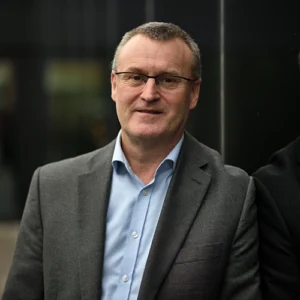Cambridge-based biopharmaceutical company Artios Pharma is advancing a new generation of precision cancer medicines by targeting the DNA Damage Response pathway, building on the success of pioneering PARP inhibitors to develop potential first-in-class therapies for some of the most challenging and deadly cancers.
What is Artios Pharma?
Artios Pharma is a UK-based biopharmaceutical company specialising in the development of innovative cancer treatments that target the DNA Damage Response (DDR) pathway. Founded in 2016 and headquartered at the Babraham Research Campus in Cambridge, with an additional office in New York City, Artios represents the next wave of precision oncology companies building on groundbreaking scientific discoveries.
The company’s name derives from the Greek word “artios,” meaning “complete” or “perfect,” reflecting its mission to develop complete solutions for patients whose cancers have limited treatment options. What distinguishes Artios from other oncology companies is its deep expertise in DDR biology, inherited directly from the scientists who helped develop olaparib (Lynparza), AstraZeneca’s pioneering PARP inhibitor that revolutionised treatment for ovarian and breast cancers.
DNA Damage Response is the collective term for cellular mechanisms that detect and repair damage to DNA molecules. Cancer cells become highly dependent on their remaining DDR pathways to survive, creating a therapeutic opportunity known as “synthetic lethality.” By targeting critical DDR proteins like ATR and DNA Polymerase theta (Polθ), Artios is expanding the precision oncology toolkit to address cancers that remain resistant to current treatments.
Artios Pharma Funding: Building a Commercial-Stage Oncology Company
Since its founding, Artios Pharma has successfully raised substantial capital to advance its pipeline from preclinical research through clinical development and toward potential commercialisation.
Funding Milestones
- Series A (2016): $33.2 million led by founding investor SV Health Investors to establish operations, build the scientific team, and initiate early clinical development.
- Series C (July 2021): $153 million to expand clinical trials for alnodesertib, advance ART6043 into clinical development, and scale the organisation for multiple concurrent clinical studies.
- Series D (November 2025): $115 million in an oversubscribed round co-led by SV Health Investors and new investor RA Capital Management, with participation from new investor Janus Henderson Investors and existing investors including Omega Funds and Novartis Venture Fund.
The oversubscribed nature of the Series D round, where investor demand exceeded the initial target, signals strong market confidence in Artios’ clinical data and commercial potential. RA Capital Management, one of the most respected healthcare investment firms globally, joined as co-lead investor, bringing deep expertise in supporting biotechnology companies through late-stage development.
This Series D brings Artios’ total capital raised to over $300 million, positioning the company as one of the best-capitalised private biotechnology companies focused on precision oncology in Europe.
Also Read: The fastest-growing deeptech startup in the UK and Ireland in 2025
Strategic Use of Series D Funds
The $115 million will be deployed across several priorities:
- Alnodesertib expansion: Enrolling additional patients with second-line pancreatic cancer and third-line colorectal cancer, building on data showing durable responses in patients with ATM-deficient tumours across eight different solid tumour types.
- ART6043 advancement: Supporting Phase 2 development following encouraging data presented at the 2025 European Society for Medical Oncology congress, with a planned randomised study in BRCA-mutant HER2-negative breast cancer.
- Pipeline development: Continued preclinical work on the DDR inhibitor antibody-drug conjugate platform and organisational scaling to support potential commercialisation.
CEO Mike Andriole emphasised the funding’s strategic importance: “This Series D accelerates our potential path to registration for both alnodesertib and ART6043, broadening development for the next generation of DNA damage response therapeutics to indications among the highest of unmet need across pancreatic, colorectal, and breast cancers, where median survival is often measured in months.”
Nikola Trbovic, Managing Partner at SV Health Investors, viewed the financing as marking Artios’ transition toward “becoming a commercially oriented organisation,” signalling the company’s move from pure research and development into preparation for product launches and market entry.
Artios Pharma Leadership
Artios was founded by a team with proven track records in DDR drug development, most notably their involvement in developing olaparib, which transformed treatment for BRCA-mutant cancers.
The company’s founding CEO, Niall Martin, Ph.D., established Artios in 2016 after identifying the broader opportunity beyond PARP inhibition. Martin’s role in identifying what became AstraZeneca’s pioneering PARP inhibitor Lynparza gave him unique insights into both the scientific opportunity and the commercial pathway for DDR therapeutics.

In August 2025, Artios appointed Mike Andriole as CEO, marking the company’s transition toward commercialisation. Andriole brings extensive experience delivering first-in-class oncology therapies in areas of high unmet need. His six-year tenure at Chimerix, subsequently acquired by Jazz Pharmaceuticals, demonstrated his ability to navigate late-stage clinical development and regulatory approval.
Pipeline and Clinical Programs
Artios has built a diversified pipeline targeting multiple points in the DDR pathway, reducing dependence on any single programme whilst maximising potential across multiple cancer types.
Alnodesertib (ART0380): Potential First-in-Class ATR Inhibitor
Alnodesertib is Artios’ lead clinical candidate, a selective inhibitor of ATR currently being evaluated in multiple clinical trials for patients with advanced or metastatic solid tumours. Key developments include:
- Clinical efficacy: The Stella Phase 1/2 study showed alnodesertib achieved a 50% confirmed overall response rate among patients with ATM-negative solid tumours when combined with low-dose irinotecan.
- FDA Fast Track designation: In September 2025, the FDA granted Fast Track designation for alnodesertib in combination with irinotecan for treating ATM-negative metastatic colorectal cancer, providing benefits including more frequent FDA interactions and potential for accelerated approval.
- Broad applicability: The drug has demonstrated durable responses in patients with eight different solid tumour types harbouring ATM deficiency, a patient population with no specifically approved treatment options.
The Series D funding will support expansion to enroll additional patients with second-line pancreatic cancer and third-line colorectal cancer, settings where median survival is often measured in months.
ART6043: Leading DNA Polymerase Theta Inhibitor
ART6043 is Artios’ second potential first-in-class candidate, which the company describes as “the most advanced clinical Polθ program in the industry.” This positioning reflects an early mover advantage in a target increasingly recognised as highly promising for precision oncology.
Following encouraging data at the 2025 ESMO congress, ART6043 is advancing into Phase 2 development. The planned Phase 2 randomised study will evaluate the drug in patients with BRCA-mutant HER2-negative breast cancer who are eligible to receive a PARP inhibitor, representing a substantial patient population with significant unmet need.
DDRi-ADCs: Next-Generation Conjugates
Artios’ preclinical DDR inhibitor antibody-drug conjugate programme represents an innovative approach where DDR inhibitors replace traditional chemotherapy payloads. This could allow DDR inhibitors to be delivered specifically to tumour cells, potentially reducing systemic exposure whilst achieving high intratumoural concentrations.
Also Read: Infinite Orbits: Leading Europe’s Commercial GEO In-Orbit Servicing Revolution
Strategic Partnerships
Artios has established collaboration agreements with Merck KGaA and Novartis to discover and develop new cancer medicines. These partnerships provide:
- Scientific validation: Major pharmaceutical companies’ willingness to collaborate signals confidence in Artios’ DDR platform and execution capabilities.
- Resource access: Specialised preclinical models, clinical development expertise, and global commercial infrastructure.
- Non-dilutive capital: Upfront payments, research funding, and milestone payments that reduce the need for equity financing.
Market Opportunity and Competitive Landscape
The market opportunity for DDR inhibitors is substantial and growing. The global PARP inhibitor market alone has reached several billion dollars annually and continues expanding as these drugs move into earlier treatment lines and additional cancer types.
Artios’ clinical progress, particularly the Fast Track designation for alnodesertib and the advancement of ART6043 as reportedly the most advanced Polθ programme clinically, provides competitive advantages in timing and regulatory positioning. The precision oncology trend, where treatments are selected based on molecular characteristics rather than organ of origin, plays to Artios’ strengths in identifying patients through biomarkers like ATM deficiency or BRCA mutation status.
Artios Pharma Key Takeaways
- Oversubscribed Series D Fuels Commercial Transition: Artios raised $115 million in November 2025 in an oversubscribed round co-led by SV Health Investors and RA Capital Management, bringing total funding to over $300 million and supporting evolution toward commercialisation under new CEO Mike Andriole’s leadership.
- FDA Fast Track Validates Clinical Approach: The September 2025 FDA Fast Track designation for alnodesertib in ATM-negative metastatic colorectal cancer validates the biomarker-driven strategy and provides regulatory advantages including potential for accelerated approval in a high unmet need population.
- Dual First-in-Class Pipeline Addresses Multiple Cancers: With alnodesertib achieving 50% response rates in ATM-negative tumours and ART6043 advancing as the most advanced Polθ inhibitor clinically, Artios has built a diversified pipeline across pancreatic, colorectal, and breast cancers where treatment options remain limited.
- Proven Expertise and Industry Validation: Founded by the team behind pioneering PARP inhibitor olaparib and backed by partnerships with Merck KGaA and Novartis, Artios combines deep scientific expertise with industry validation, positioning it to deliver next-generation precision oncology therapies.
Conclusion
Artios Pharma stands at an inflection point, transitioning from a research-focused biotechnology company to a potential commercial-stage organisation with multiple clinical programmes addressing high unmet need cancers. With over $300 million raised, FDA Fast Track designation, encouraging clinical data across multiple candidates, strategic pharmaceutical partnerships, and experienced leadership, Artios appears well-positioned to deliver on the promise of DDR-targeted therapy.
The coming years will be critical as alnodesertib and ART6043 progress through pivotal clinical trials that could support regulatory submissions. Success in these programmes would not only benefit patients but also validate Artios’ broader platform, potentially leading to additional pipeline candidates, partnerships, and ultimately either a successful public offering or strategic acquisition. For a startup and funding-focused audience, Artios represents a compelling case study in how deep scientific expertise, strategic capital deployment, and experienced leadership can transform academic discoveries into commercial opportunities addressing billion-dollar markets.

